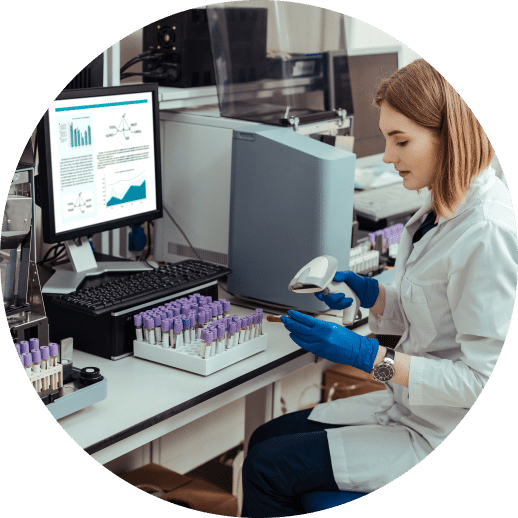Transformation Projects
Hearing Loss
Improving equity of access to genetic testing and research in hearing loss.

Project Background
There are many genetic causes of hearing loss. Identifying the specific gene involved may provide information about the likelihood of hearing impairment changing over time, management options and confirm eligibility for clinical trials. It may also provide information about possibility of other health problems and the need for screening or monitoring, and the likelihood of other family members, including additional children, being affected by the same condition.
Before the development of the national genomic medicine service (GMS), genetic testing for deafness was done in a non-standardised way and the majority of genetic testing was undertaken by clinical genetics. This was due to several factors including cost of tests and confidence of local teams to manage the test and deliver results.
The National Genomic Test Directory makes standardised, large panel genetic testing available for eligible patients around the country. It is also now possible for healthcare professionals outside of clinical genetics to manage this genetic testing for patients with hearing loss. The main clinical groups for whom this is now relevant include:
- Audiovestibular medicine physicians
- Paediatricians with an interest in audiology
- ENT/ Cochlear implant physicians
Project Overview
The North Thames GMS is working to improve equity of access to testing, clinical trials and research for genetic investigations in hearing loss. We are doing this by;
- Mapping established pathways for genomic testing. This includes auditing genetic testing to understand firstly the origin of test referrals (clinical genetics/ mainstream clinicians) and whether this is changing. Secondly the outcome of testing in terms of diagnoses reported, overall diagnostic rates and variants of uncertain significance. This information helps feedback into educational initiatives.
- Supporting the consolidation of a genetic hearing service within the North Thames GMS region, based at Great Ormond Street Hospital, to include a specialist genetic counsellor, coordination of a specialist MDT and better integration with the audiovestibular medicine team allied health care professionals.
- Developing improved identification and pathways for recruitment of patients eligible for clinical trials and supporting movement towards establishment of patient registries.
Delivering educational initiatives including bringing together local and national networks of interested colleagues, and creating resources and information for clinicians and supporting resources for patients.
We have completed a National audit of R67 (hearing loss panel) genetic testing in collaboration with the North West GLH. The outcomes were presented at a National Conference (BSGM) and show fantastic engagement in genomics from the AVM community, the majority of genetic testing in hearing loss is now being requested outside of clinical genetics services.
We have established a North Thames Genomic- Audiovestibular Medicine MDT with colleagues from genetics and AVM.
We have a genetic counsellor led hearing loss genetic clinic running alongside a consultant genetic hearing loss clinic.
We have worked collaboratively with North West GLH to deliver a programme of national education sessions on genetic testing in hearing loss targeting AVM, Otology and paediatricians with an interest in hearing loss. This has included teaching for BAPA, BAAP and RSM-otology. We have also delivered local bespoke training and education sessions for audiology, genetics and AVM clincians.
We have provided tailored genetic teaching and clinical training to North Thames AVM SPRs.
We are working with North West GLH to update patient resources and information in conjunction with the National Deaf Childrens Society. This will include written and multimedia information.
Work is ongoing with the UCL-BRC Otogenetics group to establish better clinical research collaboration. This will hopefully facilitate recruitment of patients and families for ongoing research including the possibility of clinical trials in the future.
Clinical and Patient Resources
Specialist Clinical Services at GOSH:
There is a specialist genetic hearing loss clinic at GOSH with a consultant clinical geneticist (Dr Emma Clement) and genetic counsellor (Leanne Barrett).We accept referrals for children and adults (within the North East Thames Region) with (or with a family history of) possible genetic hearing loss. In most cases we request that appropriate preliminary investigations have been undertaken by local teams and that these are included with the referral.
There is a specialist dual sensory clinic at GOSH. This has input from Ophthalmology, Audiovestibular medicine and Clinical Genetics. This caters for children with dual sensory impairment including those with Usher syndrome, Norrie disease and others. Please see the Dual Sensory Clinic Leaflet for further information.
Information for health care professionals:
Please see:
- Referrals for Genomic Testing in Hearing Loss: an update for clinicians
- Genomic Testing FAQs
Information for patients and families:
- Deafness Gene Panel Testing: Information for patients and families
- Welcome to the Dual Sensory Clinic
Specific Patient information leaflets and Videos in progress
Key Contacts
Dr Emma Clement, Consultant in Clinical Genetics, Great Ormond Street Hospital For Children NHS Foundation Trust